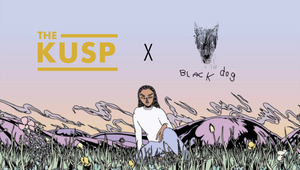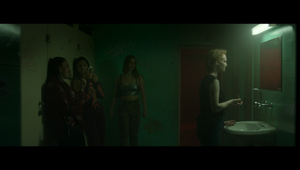
The Business of Production: Kai-Lu Hsiung Runs Banks and Avengers Teams

Without production, the advertising industry would be little more than a cloud of unrealised ideas. Turning thought into reality – and making it beautiful along the way – is no mean feat.
But right now, the production landscape is working its magic in a world of unprecedented change. There are new opportunities and avenues to explore, new business models arising and new technologies to play with. Within that, there are new tensions too.
In this new series, LBB’s Zoe Antonov speaks to experienced producers, production company owners, heads of TV and new business professionals on all sides of the industry to get their views on the pressing issues facing the industry and to get an insight into how they and their companies are navigating that change.
At RSA Films, global managing director Kai-Lu Hsiung knows exactly what it takes to transform those ideas into reality – and how much harder that’s become in a whirlwind of change. Last month, The British Arrows awarded Kai with a Fellowship for her contribution to UK production – the award, accompanied by a congratulatory speech from Ridley Scott, recognised her as a vital contributor to the UK creative industries, having led RSA for 25 years.
So, as one of the industry’s most experienced and respected voices, today she offers a candid perspective on the pressures, pivots, and possibilities reshaping production today, all through her own POV. Read on to see the production industry unravel through one week in Kai’s professional life.
“Running a Production Company, Not a Bank”
Few issues spark as much frustration in the world of production as payment terms. For Kai, it's one of the most frequent daily headaches. “Sixty days seems to be normal now, not 30,” she says. The knock-on effect of these delays is significant. Production companies often bankroll jobs before the first payment has even arrived, and sometimes, that doesn't happen until the day before the shoot.
“It’s getting worse and worse,” says Kai. “It’s annoying because when the first 50% comes a day before the shoot, that is realistically the money that should have been used for the production. Then, you can put your second 50% when the edit is approved, but the small print has extended the waiting times on this.”
The shift in expectations puts enormous strain on cash flow, especially when shoots happen overseas. While some protections exist – like the AICP's rule in the US allowing 75% to be invoiced upfront on any and all foreign shoots – Kai notes that UK producers often aren’t afforded the same flexibility. “We’re really fighting for that,” she says, noting how challenging it is to front costs like casting, scouting, and crew abroad without timely payment.
To add to this, a volatile exchange rate makes the financial burden even heavier. “You want to run a production company, not a bank,” Kai says. But increasingly, the lines are blurring.
The Unsustainable Pitch Arms Race
Another persistent challenge, or an inevitable change in the production world, is the evolution and inflation of the pitch process. “People are getting fed up with these really big treatments,” Kai explains. Where directors once submitted a page of writing and a single visual in her own words, decks now extend to 60 or 80 pages, complete with custom soundtracks, AI-generated storyboards, and extensive design work.
There are signs of a reset, though. Recently, Kai says she was told to cap a treatment at 20 pages – then quickly asked to cut it down to two. “The talent didn’t have time to read through it all over the weekend,” she explains. “We asked if we can do two big pages with really tiny writing,” she jokes, “But no, they actually asked for just two pages."
While initially jarring, the shift is a welcome one. “There’s so much waffle in some of those documents. If it forces people to focus, maybe it’s healthier."
Still, the process remains resource-intensive and speculative – it all goes back to the money point above. "You do a budget for Sofia, Prague and London – just to show casting costs, for example – all for a one-in-three chance,” she says. And even with efforts to introduce proportionality based on job size, smaller projects often demand just as much effort on the pitch as high-budget ones. “It’s a horrible dead-weight cost,” she adds. But, the overinflation of pitches might be driven by the endless creation of assets. Which leads us to the next point in this conversation…
AI: Threat and Tool
Like many in the industry, Kai has her eye on AI. In some cases, it’s already changing the game – especially in treatment generation, visualisation, and storyboarding. While she sees its efficiency benefits for less creative tasks, she’s cautious about its long-term impact on the craft. “It’s great for pack shots, versioning, subtitling,” she says. “But if you're ever talking about a real person and a real story – you can’t veer away from authenticity.”
There’s also much concern for emerging talent, especially in an industry like this one, where runners being on set and present at meetings is the initial osmosis through which young creatives learn the ropes.
“Note-taking used to be how people learned – sitting in meetings, absorbing everything,” she reflects. With AI now generating annotated Zoom notes and taking care of some jobs usually given to those at the infancy of their career, those valuable experiences risk being lost.
“That’s been the challenge since covid too – getting young people back in the room so they can learn.”
Yet Kai sees potential for AI to take the drudgery out of certain tasks, freeing up creative minds to focus on ideas. The key, she believes, is knowing where to draw the line between helpful automation and creative compromise.
Culture Over Scale
At the heart of RSA Films’ decades-long resilience is their diversity of output – from high-end advertising to documentaries, experiential projects and branded content. Kai likens it to cooking a meal: “Something in the oven, something on the hob – you need different things cooking at different speeds.” It is this multifaceted approach that allows RSA to weather dry periods in one area with opportunities in another.
Volume is not the root of success, though – oftentimes, it’s about relationships and relevance. Whether brainstorming new ventures around Ridley Scott’s coming BFI retrospective or supporting a director on a Metallica documentary, Kai is constantly “building out worlds” for her talent.
“It’s about assembling the right ‘Avengers team’ for each project,” she says. “‘Who can we get together’ and ‘Who is right for this’ are questions I ask myself on the daily.”
Inspiration is also about making sure that one is aware of the possibilities that take things forward for the business. “You’re only as good as the team you surround yourself with,” Kai says. “A lot of this business is about keeping on top of who’s doing what and who to call or message at any given moment, in any particular area.” Ultimately, it is this knowledge that opens up the world of production for companies like RSA.
Finding and Nurturing Talent, Both Seasoned and New
One tale as old as time is that talent is at the core of RSA’s future, both behind the camera and within the company itself. “We’ve just promoted our head runner to a director’s rep,” Kai shares. At the same time, other young talent are exploring research and production roles, helping to build a new generation from within. Initiatives like internships through the BFI, as well as RSA’s Black Dog division activities further feed this pipeline. What helps immensely too, however, is the level of aptitude these people possess: “They’re incredibly confident, talented, and like, 20 years old. I’m like ‘How?!’.”
Not only this, but RSA has the privileged position of having a stake in film and TV, as well as commercial. On the director’s side, Kai is seeing fresh interest from filmmakers who hadn’t previously considered ads. “They’ve gone down the TV or film route, and suddenly they’re seeing the potential in commercials and are interested.”
RSA’s ability to offer crossover opportunities – and the cultural credibility of being at Ridley Scott’s table – makes the company an attractive home for talent. Kai’s job is to show these directors “what a career in commercials would really look like and if they’d really want to do it.” She adds: “We need to make sure that it’s right for them, and for us, and the expectations are well understood. We always try to help and realise the reasons for which these directors came to us rather than somewhere else.”
The Real Work Is in Saying ‘No’
Perhaps the most telling insight from Kai is about boundary-setting. “Sometimes, you just have to walk away,” she says, recalling a recent project where a lack of alignment and a late-stage creative reversal forced RSA to pull out.
“I get that there is hope with certain clients, that if you do the smaller job they might give you the big one. I get it. They want to see how you perform, so you try and make it work. But there comes a point where you just go ‘This isn’t working’.”
These are the important decisions to be made in the industry, and often, the most empowering ones. In an industry where the pressure to say yes is ever-present, learning when – and how – to say no is a mark of maturity.
“It’s people’s time, people’s energy. If it’s not right, don’t do it,” says Kai. And this is the mindset RSA instills in all of its directors too. “I said to one director recently, ‘Look, you’re going to be on this for at least two months, can you imagine yourself sitting in quite a few pre-production meetings and talking about it?’. You don’t believe it, you don’t do it – and that’s hard to admit.”
Judging Creativity at the Highest Level
Between the day-to-day of running the RSA and building worlds around her talent, Kai is also deeply involved in shaping the industry’s creative benchmarks, like she always has.
This year, she’s judging the Direction category at the D&AD Awards. “I love that, it’s a nice part of the job” she says of the experience. “It takes quite a lot of time, but you want to do it properly,” she says. “If you do three or four juries a year it’s just too much. Two is the max for me – you need the headspace.”
Still, she relishes the opportunity to step back from the business pressures and immerse herself in pure creativity.
“It’s a real privilege to see the work coming in from all over the world. You come across ideas and executions that are completely new – things that just wouldn’t land on your desk otherwise.”
Having previously chaired the jury for the Branded Content category and participated in the coveted Black Pencil discussions, she understands the weight of responsibility in recognising those projects that set the standard. It’s also a chance to see the best ideas from around the world and reflect on where creativity is headed. “There’s always something unexpected,” she adds – a reminder that, even with decades of experience, there’s still more to be inspired by in the industry of change.
And there you have it – a week in the life of the RSA’s global managing director, opening the door to the production industry’s major pressure points. But, for Kai, the business side of production is about creating the conditions for great work to thrive. That means better payment structures, evolving outdated pitch norms, embracing useful tech while protecting the talent, and fostering a culture of true collaboration. All of this while balancing on top of the shifting tectonic plates – both geopolitically, and locally for the UK market.
If the industry plans on standing upright, it will be because people like Kai are helping it do so – thoughtfully, decisively, and with a clear eye on the bigger picture.















